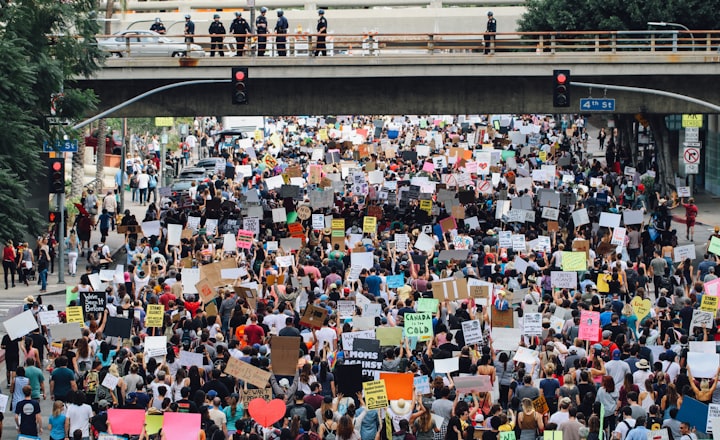Beyond Outrage
A story of "Essentials"
Lockdowns aren't fun, but there's something particularly rage-inducing about staying home and doing your bit, then turning on the news to footage of a rally touting conspiracy theories.
Australia has been lucky, almost unbelievably lucky, in our Pandemic experience.
We had pre-existing bio-security and border security, and a lack of land borders. That made it easier to control the number of international flights coming in to a managable level.
Our biggest international airports, in Sydney and Melbourne, were in cities that were designed around tourism, with plenty of hotels able to be used for self-isolation for returning travellers. As a population, we're far more spread out and far less numerous than most other countries, again helping to reduce transmission. Unlike most other continents and areas of equivalent geographical size, we have a single government, and only eight state/territory governments, making it far easier to work out a cohesive national strategy.
(Our Prime Minister, while an incompetent, overly-religious moron, is at least a moron who can be persuaded to stay out of the way while the adults handle an emergency. We have the UK and the then-President of the USA beat in that, at least. His one job was the vaccine rollout, and he even managed to mess that up.)
In addition, having just suffered through a bushfire season lasting almost six months, followed by flooding in parts of the country, we were kind of relieved by a state of emergency that didn't require much beyond staying home, limiting our outdoor activities. At least this time we weren't choking on smoke through our masks!

So what happened?
Part of it was complacency. Having kept the other variants mostly at bay, we weren't prepared for how far and fast the Delta Variant could spread.
Part of it was sheer bad luck and timing. The vaccine rollout didn't include paid time off for essential workers to be vaccinated, or make it mandatory for employers to give it. The workplace rollout focussed on facilities like hospitals and Aged and Disability Care homes. Maybe the smaller retirement villages, if they were lucky.
Everyone who didn't work in one of those places had to make their own arrangement, scheduled around shifts and other responsibilities, and with bookings going fast and a limited supply, that wasn't as easy as it sounded.
Australia put all their eggs into the AstraZeneca basket, banking on the ability to manufacture it locally, rather than relying on overseas shipments. Roughly six weeks into the rollout, AstraZeneca was 'suggested' to be restricted to those 50 and older. Surprise, surprise, the majority of essential workers were younger than that, and got stuck waiting months for a Pfizer appointment.
But hey, case numbers were down again, it was ok to put off being vaccinated, right?

The Delta Variant doesn't confine itself to the elderly and those with weaker immune systems. It goes for everyone, particularly children. With only about half of the eligible population vaccinated, and less than 20% of essential workers, the new outbreak hit hard.
It also really exposed the weaknesses in the system.
Unlike the first lockdown, with most outbreaks in understaffed Aged Care homes, the Delta Variant spread through workplaces and schools. It was most virulent in children, teenagers and young adults. In the Vaccine "Strollout", those eligible to be vaccinated were hospital and border-control staff, workers in residential facilities, and the elderly. In short, the front-line and those most vulnerable in the first wave.
Of those most vulnerable to Delta, the vast majority weren't even eligible to be vaccinated, and of those that were, only a minority had taken the opportunity, most content to wait months for their Pfizer shot.
It's all very well to talk about staying home and avoiding social gatherings, but grocery orders don't pack themselves, someone has to drive delivery trucks, trains, buses and taxis, and Health and Care workers can't work from home.
Essential occupations, predominantly staffed by teens and under 40s, and heavily casualised. The "Essential Workers" that politicians and newscasters were happy to praise as heroes, as long as they didn't have to pay them like the entire country would shut down without their efforts, couldn't afford to stay home, and were most likely to come into work even when sick, because there weren't enough permanent staff to cover for them. Other than Hospital Staff and Aged/Disability Care workers, none of those "Essentials" had even been offered the chance to be vaccinated yet.
The Delta outbreak started with a driver who, despite ferrying returning travellers between the airport and quarentine hotels, had not been vaccinated. It spread through infected workers and people attending parties. The Good News: vaccines were effective.
The Bad News: Australian vaccination rates were in the ditch, and a steady diet of Fox News and shock-jock vaccine skeptics wasn't helping.
It also didn't help that the most affected areas were the suburbs where low-wage essential workers could afford to live: Fairfield, Blacktown, the Outer-West and South-Western Sydney. They were also areas populated by large and sometimes inter-generational households in smaller dwellings, communities with a large refugee or immigrant population who spoke English as a second or third language, and had a healthy distrust of both government and law enforcement.
Unlike the Inner West and North Shore, social distancing within the home wasn't always possible. Unlike Metropolitan Sydney, apartment weren't filled by single people or couples, but by entire families. Many watched the news, but with foreign subtitles or an international station.
Then the protests started.
At first, such protests were brushed off as "Oh, those silly Americans... glad we're on the other side of the Pacific!" or occasionally "Ugh, can entitled Rich Bastards stop ruining it for everyone?"
Most of us were willing to hunker down, wait for it to be over, and spend the intervening time reaching out to our mates on Zoom or FaceTime. Those of us who were employed looked for ways to support those who weren't, and who were struggling with reduced hours. We bitched about Footballers throwing parties, grumbled about the wealthy buggers who thought restrictions didn't apply to them, and reassured each other that it wouldn't be forever.
Despite that, these protests weren't unanticipated.
The necessity of only leaving your home for essential reasons was stressed daily, as was the need to wear a mask in public. Fines for breaching Public Health Orders ramped up. Police were given increased authority.
Hospitals braced for the aftermath of a Super-spreader event.

It's hard not to feel this way at times.
We go out, risking our lives and health to take care of others, only to see dozens of people refuse to wear masks or use hand sanitiser, ignore the QR codes and complain about having to be considerate of others.
If I'm wearing my uniform, I tell people I'm working in the infectious ward, because I don't have the energy for 5-10 minutes of verbal abuse while explaining that yes, they need to social distance and back the F*** off.
Last weekend's rally, like the two before it, was only the latest in a long chain of events where people decided that their personal convenience was more important than the lives and health of their communities, but it promises to be the most damaging.
We all want lockdowns to end. We need financial support to withstand the lockdowns. Masks are not comfortable and having to wear one for hours at a time makes me want to claw my face off.
But the way to do that is by reducing transmissions, not by attending a super-spreader event that will only delay our ability to open back up.
Seriously, though.
Other countries are suffering through tens of thousands of new cases per day, and some even in the hundreds of thousands. Afganistan's capitol just fell to an extremist faction, and thousands of men, women and children are trying desperately to flee before the threat of rape, murder, or forcible conscription as canon fodder. Several other countries are struggling with insurrections, failed states, and totalarian regimes.
All you are being asked to do is wear a mask and stay home as much as possible. Maybe get a potentially life-saving vaccine, while you're at it. The irony being that the people screaming loudest are mostly old enough to remember polio and iron lungs, and the difference vaccines made then.
That's not oppression or the sign of a facist or tyrannical government: that's the mild inconvenience that comes with being part of a society!
Is this really the hill you want to (perhaps literally) die on?

Written for the Vocal Creators Chronicle
Click Here to return to the magazine
About the Creator
Natasja Rose
I've been writing since I learned how, but those have been lost and will never see daylight (I hope).
I'm an Indie Author, with 30+ books published.
I live in Sydney, Australia






Comments
There are no comments for this story
Be the first to respond and start the conversation.